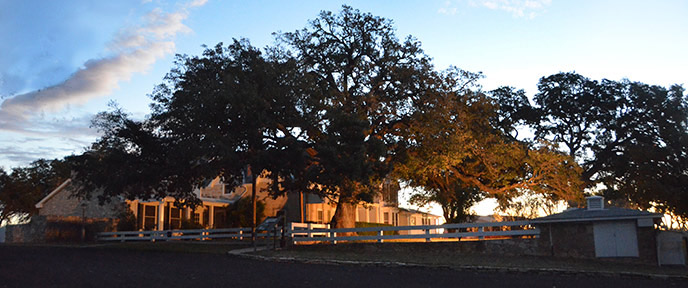News Release
You are viewing ARCHIVED content published online before January 20, 2025.
Please note that this content is NOT UPDATED, and links may not work. For current information,
visit https://www.nps.gov/aboutus/news/index.htm.

NPS Photo/David Valdez
|
Subscribe
|
Contact: Vanessa Torres, 830-868-7128
STONEWALL, Texas – On Sunday, August 21st, Lyndon B. Johnson National Historical Park will launch Texas White House: Past, Present, and Future, a series of short educational videos on the history and importance of the Texas White House and LBJ Ranch. Videos will be released daily via the park’s Facebook page (@LBJohnsonNPS) and will also be available on the park’s website and social media. The last video of the five-part series will be released on Thursday, August 25th, the 106th anniversary of the National Park Service.The first three episodes of Texas White House: Past, Present, and Future will highlight the history of the land: from native peoples to the purchase of the ranch home by the Johnsons in the 1950s, the transformation of the home into the “Texas White House,” and Lady Bird Johnson’s time at the ranch after President Johnson’s passing. The last two episodes cover the National Park Service’s efforts to open the Texas White House to the public in 2008 while addressing the challenges of protecting and preserving the historic buildings and landscapes of the Texas White House Complex. The last episode of the five-part series highlights the structural and environmental issues that led to the home’s closure in 2018 and shares details of the National Park Service’s ongoing efforts to rehabilitate the Texas White House and surrounding complex.
“We’re excited to educate visitors through this short video series that shines a light on the Texas White House Complex, its history, how it is utilized today, and the National Park Service’s historic preservation mission. Lyndon B. Johnson National Historical Park seeks to engage visitors through a variety of methods, both virtually and onsite,” states Program Manager of Interpretation, Vanessa Torres.
Lyndon B. Johnson National Historical Park will receive approximately $7.8 million to rehabilitate the historic Texas White House, nearby communications buildings, and the surrounding site. The rehabilitation work will replace outdated electrical, mechanical, HVAC, and alarm systems, stabilize the building’s foundation, and repair internal/external separation walls. The project also includes incorporating sustainable practices, public safety upgrades, and accessibility improvements that will allow the facility to serve increased numbers of visitors and withstand extreme weather events. This critical project will ensure the long-term integrity of this fundamental park resource and allow it to be reopened to the public.
The project is being funded by the 2020 Great American Outdoors Act (GAOA) which, along with the Bipartisan Infrastructure Law and other construction funding sources, is part of a concerted effort to address the large maintenance backlog in national parks. Supported by revenue from energy development, GAOA's the Legacy Restoration Fund provides up to $1.3 billion per year for five years to make significant enhancements in national parks to ensure their preservation and provide opportunities for recreation, education, and enjoyment for current and future visitors. The park is currently in the design phase of the project, which is expected to last through 2023.
Throughout the project, the park will produce additional videos documenting the rehabilitation of the Texas White House and other park resources.
About Lyndon B. Johnson National Historical Park:
Established in 1969, Lyndon B. Johnson National Historical Park preserves the historic structures and Texas Hill Country landscapes linked to the ancestry, life, and legacy of President Johnson. The park also provides opportunities for visitors to compellingly experience the places that shaped the personality, character, and political philosophy of Lyndon Johnson throughout his life and that served as a setting for a remote White House during his presidency. Visit us at www.nps.gov/LYJO, on Facebook www.facebook.com/LBJohnsonNPS, and Instagram www.Instagram.com/LBJohnsonNPS.
About the National Park Service:
More than 20,000 National Park Service employees care for America’s 423 national parks and work with communities across the nation to help preserve local history and create close-to-home recreational opportunities. Learn more at www.nps.gov.
Last updated: November 15, 2024
